Vincenzo Lomonaco
HAM: Hierarchical Adapter Merging for Scalable Continual Learning
Sep 16, 2025Abstract:Continual learning is an essential capability of human cognition, yet it poses significant challenges for current deep learning models. The primary issue is that new knowledge can interfere with previously learned information, causing the model to forget earlier knowledge in favor of the new, a phenomenon known as catastrophic forgetting. Although large pre-trained models can partially mitigate forgetting by leveraging their existing knowledge and over-parameterization, they often struggle when confronted with novel data distributions. Parameter-Efficient Fine-Tuning (PEFT) methods, such as LoRA, enable efficient adaptation to new knowledge. However, they still face challenges in scaling to dynamic learning scenarios and long sequences of tasks, as maintaining one adapter per task introduces complexity and increases the potential for interference. In this paper, we introduce Hierarchical Adapters Merging (HAM), a novel framework that dynamically combines adapters from different tasks during training. This approach enables HAM to scale effectively, allowing it to manage more tasks than competing baselines with improved efficiency. To achieve this, HAM maintains a fixed set of groups that hierarchically consolidate new adapters. For each task, HAM trains a low-rank adapter along with an importance scalar, then dynamically groups tasks based on adapter similarity. Within each group, adapters are pruned, scaled and merge, facilitating transfer learning between related tasks. Extensive experiments on three vision benchmarks show that HAM significantly outperforms state-of-the-art methods, particularly as the number of tasks increases.
Combining Pre-Trained Models for Enhanced Feature Representation in Reinforcement Learning
Jul 09, 2025Abstract:The recent focus and release of pre-trained models have been a key components to several advancements in many fields (e.g. Natural Language Processing and Computer Vision), as a matter of fact, pre-trained models learn disparate latent embeddings sharing insightful representations. On the other hand, Reinforcement Learning (RL) focuses on maximizing the cumulative reward obtained via agent's interaction with the environment. RL agents do not have any prior knowledge about the world, and they either learn from scratch an end-to-end mapping between the observation and action spaces or, in more recent works, are paired with monolithic and computationally expensive Foundational Models. How to effectively combine and leverage the hidden information of different pre-trained models simultaneously in RL is still an open and understudied question. In this work, we propose Weight Sharing Attention (WSA), a new architecture to combine embeddings of multiple pre-trained models to shape an enriched state representation, balancing the tradeoff between efficiency and performance. We run an extensive comparison between several combination modes showing that WSA obtains comparable performance on multiple Atari games compared to end-to-end models. Furthermore, we study the generalization capabilities of this approach and analyze how scaling the number of models influences agents' performance during and after training.
Task-Agnostic Experts Composition for Continual Learning
Jun 18, 2025Abstract:Compositionality is one of the fundamental abilities of the human reasoning process, that allows to decompose a complex problem into simpler elements. Such property is crucial also for neural networks, especially when aiming for a more efficient and sustainable AI framework. We propose a compositional approach by ensembling zero-shot a set of expert models, assessing our methodology using a challenging benchmark, designed to test compositionality capabilities. We show that our Expert Composition method is able to achieve a much higher accuracy than baseline algorithms while requiring less computational resources, hence being more efficient.
Parameter-Efficient Continual Fine-Tuning: A Survey
Apr 18, 2025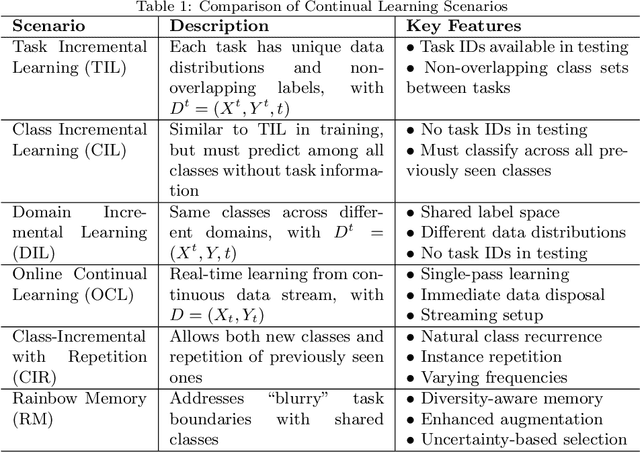

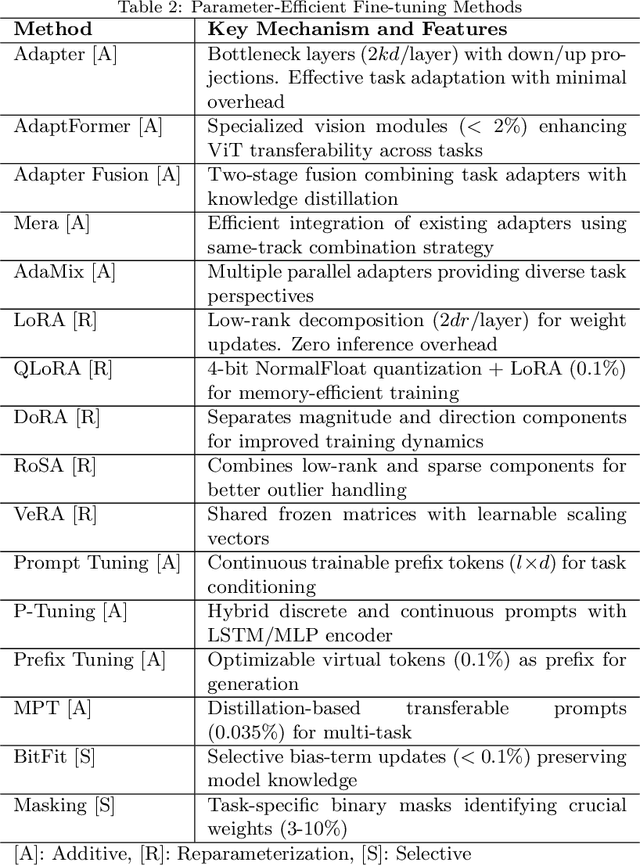
Abstract:The emergence of large pre-trained networks has revolutionized the AI field, unlocking new possibilities and achieving unprecedented performance. However, these models inherit a fundamental limitation from traditional Machine Learning approaches: their strong dependence on the \textit{i.i.d.} assumption hinders their adaptability to dynamic learning scenarios. We believe the next breakthrough in AI lies in enabling efficient adaptation to evolving environments -- such as the real world -- where new data and tasks arrive sequentially. This challenge defines the field of Continual Learning (CL), a Machine Learning paradigm focused on developing lifelong learning neural models. One alternative to efficiently adapt these large-scale models is known Parameter-Efficient Fine-Tuning (PEFT). These methods tackle the issue of adapting the model to a particular data or scenario by performing small and efficient modifications, achieving similar performance to full fine-tuning. However, these techniques still lack the ability to adjust the model to multiple tasks continually, as they suffer from the issue of Catastrophic Forgetting. In this survey, we first provide an overview of CL algorithms and PEFT methods before reviewing the state-of-the-art on Parameter-Efficient Continual Fine-Tuning (PECFT). We examine various approaches, discuss evaluation metrics, and explore potential future research directions. Our goal is to highlight the synergy between CL and Parameter-Efficient Fine-Tuning, guide researchers in this field, and pave the way for novel future research directions.
Continual Learning Should Move Beyond Incremental Classification
Feb 17, 2025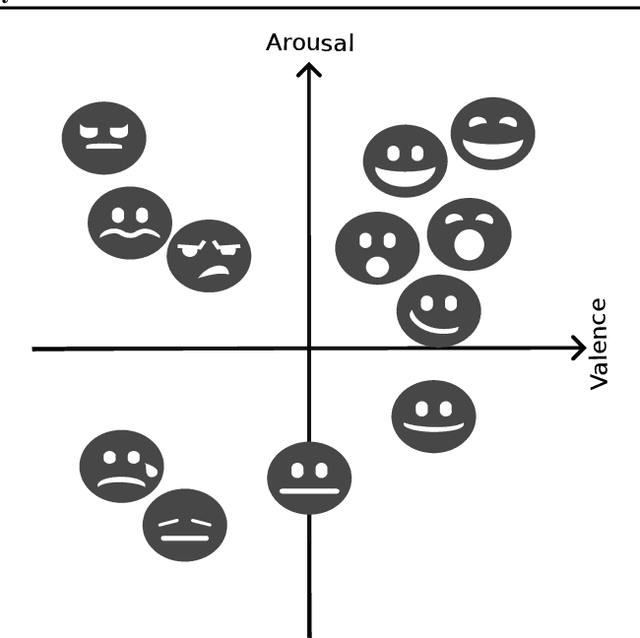
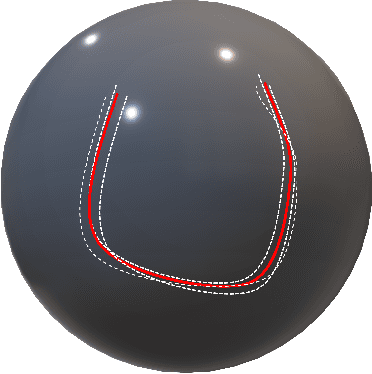
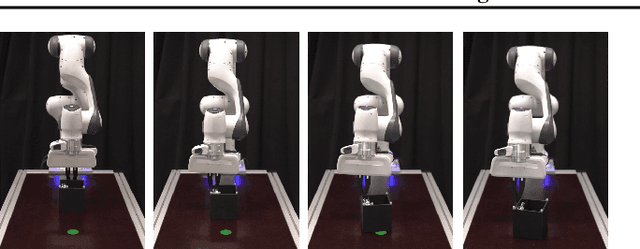
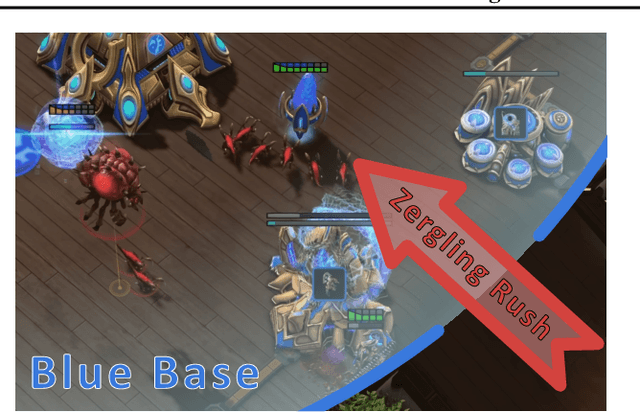
Abstract:Continual learning (CL) is the sub-field of machine learning concerned with accumulating knowledge in dynamic environments. So far, CL research has mainly focused on incremental classification tasks, where models learn to classify new categories while retaining knowledge of previously learned ones. Here, we argue that maintaining such a focus limits both theoretical development and practical applicability of CL methods. Through a detailed analysis of concrete examples - including multi-target classification, robotics with constrained output spaces, learning in continuous task domains, and higher-level concept memorization - we demonstrate how current CL approaches often fail when applied beyond standard classification. We identify three fundamental challenges: (C1) the nature of continuity in learning problems, (C2) the choice of appropriate spaces and metrics for measuring similarity, and (C3) the role of learning objectives beyond classification. For each challenge, we provide specific recommendations to help move the field forward, including formalizing temporal dynamics through distribution processes, developing principled approaches for continuous task spaces, and incorporating density estimation and generative objectives. In so doing, this position paper aims to broaden the scope of CL research while strengthening its theoretical foundations, making it more applicable to real-world problems.
Adaptive AI-based Decentralized Resource Management in the Cloud-Edge Continuum
Jan 27, 2025Abstract:The increasing complexity of application requirements and the dynamic nature of the Cloud-Edge Continuum present significant challenges for efficient resource management. These challenges stem from the ever-changing infrastructure, which is characterized by additions, removals, and reconfigurations of nodes and links, as well as the variability of application workloads. Traditional centralized approaches struggle to adapt to these changes due to their static nature, while decentralized solutions face challenges such as limited global visibility and coordination overhead. This paper proposes a hybrid decentralized framework for dynamic application placement and resource management. The framework utilizes Graph Neural Networks (GNNs) to embed resource and application states, enabling comprehensive representation and efficient decision-making. It employs a collaborative multi-agent reinforcement learning (MARL) approach, where local agents optimize resource management in their neighborhoods and a global orchestrator ensures system-wide coordination. By combining decentralized application placement with centralized oversight, our framework addresses the scalability, adaptability, and accuracy challenges inherent in the Cloud-Edge Continuum. This work contributes to the development of decentralized application placement strategies, the integration of GNN embeddings, and collaborative MARL systems, providing a foundation for efficient, adaptive and scalable resource management.
Continually Learn to Map Visual Concepts to Large Language Models in Resource-constrained Environments
Jul 11, 2024



Abstract:Learning continually from a stream of non-i.i.d. data is an open challenge in deep learning, even more so when working in resource-constrained environments such as embedded devices. Visual models that are continually updated through supervised learning are often prone to overfitting, catastrophic forgetting, and biased representations. On the other hand, large language models contain knowledge about multiple concepts and their relations, which can foster a more robust, informed and coherent learning process. This work proposes Continual Visual Mapping (CVM), an approach that continually ground vision representations to a knowledge space extracted from a fixed Language model. Specifically, CVM continually trains a small and efficient visual model to map its representations into a conceptual space established by a fixed Large Language Model. Due to their smaller nature, CVM can be used when directly adapting large visual pre-trained models is unfeasible due to computational or data constraints. CVM overcome state-of-the-art continual learning methods on five benchmarks and offers a promising avenue for addressing generalization capabilities in continual learning, even in computationally constrained devices.
I Know How: Combining Prior Policies to Solve New Tasks
Jun 14, 2024Abstract:Multi-Task Reinforcement Learning aims at developing agents that are able to continually evolve and adapt to new scenarios. However, this goal is challenging to achieve due to the phenomenon of catastrophic forgetting and the high demand of computational resources. Learning from scratch for each new task is not a viable or sustainable option, and thus agents should be able to collect and exploit prior knowledge while facing new problems. While several methodologies have attempted to address the problem from different perspectives, they lack a common structure. In this work, we propose a new framework, I Know How (IKH), which provides a common formalization. Our methodology focuses on modularity and compositionality of knowledge in order to achieve and enhance agent's ability to learn and adapt efficiently to dynamic environments. To support our framework definition, we present a simple application of it in a simulated driving environment and compare its performance with that of state-of-the-art approaches.
Calibration of Continual Learning Models
Apr 12, 2024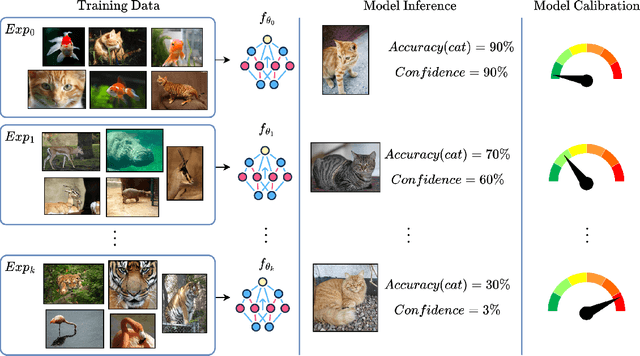
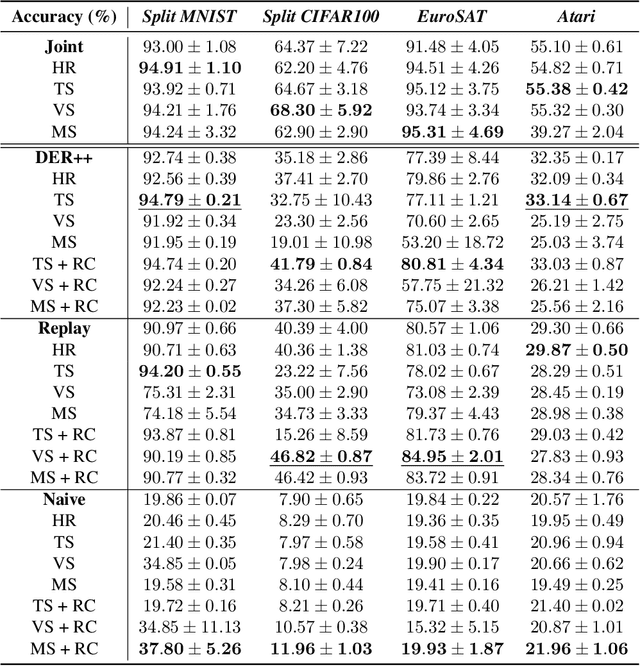
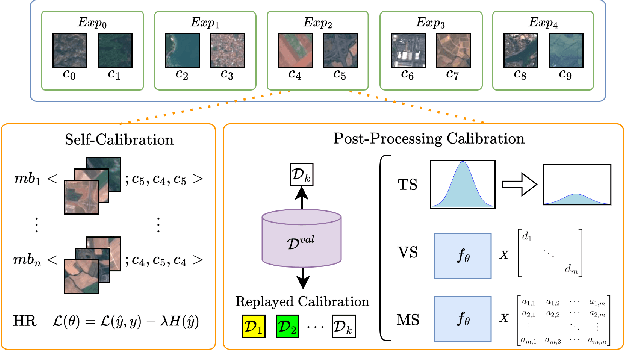
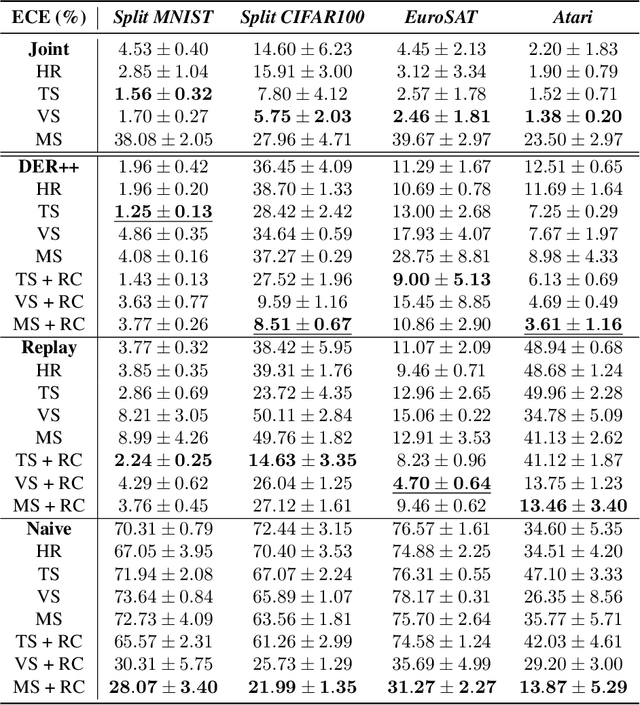
Abstract:Continual Learning (CL) focuses on maximizing the predictive performance of a model across a non-stationary stream of data. Unfortunately, CL models tend to forget previous knowledge, thus often underperforming when compared with an offline model trained jointly on the entire data stream. Given that any CL model will eventually make mistakes, it is of crucial importance to build calibrated CL models: models that can reliably tell their confidence when making a prediction. Model calibration is an active research topic in machine learning, yet to be properly investigated in CL. We provide the first empirical study of the behavior of calibration approaches in CL, showing that CL strategies do not inherently learn calibrated models. To mitigate this issue, we design a continual calibration approach that improves the performance of post-processing calibration methods over a wide range of different benchmarks and CL strategies. CL does not necessarily need perfect predictive models, but rather it can benefit from reliable predictive models. We believe our study on continual calibration represents a first step towards this direction.
Continual Policy Distillation of Reinforcement Learning-based Controllers for Soft Robotic In-Hand Manipulation
Apr 05, 2024Abstract:Dexterous manipulation, often facilitated by multi-fingered robotic hands, holds solid impact for real-world applications. Soft robotic hands, due to their compliant nature, offer flexibility and adaptability during object grasping and manipulation. Yet, benefits come with challenges, particularly in the control development for finger coordination. Reinforcement Learning (RL) can be employed to train object-specific in-hand manipulation policies, but limiting adaptability and generalizability. We introduce a Continual Policy Distillation (CPD) framework to acquire a versatile controller for in-hand manipulation, to rotate different objects in shape and size within a four-fingered soft gripper. The framework leverages Policy Distillation (PD) to transfer knowledge from expert policies to a continually evolving student policy network. Exemplar-based rehearsal methods are then integrated to mitigate catastrophic forgetting and enhance generalization. The performance of the CPD framework over various replay strategies demonstrates its effectiveness in consolidating knowledge from multiple experts and achieving versatile and adaptive behaviours for in-hand manipulation tasks.
 Add to Chrome
Add to Chrome Add to Firefox
Add to Firefox Add to Edge
Add to Edge